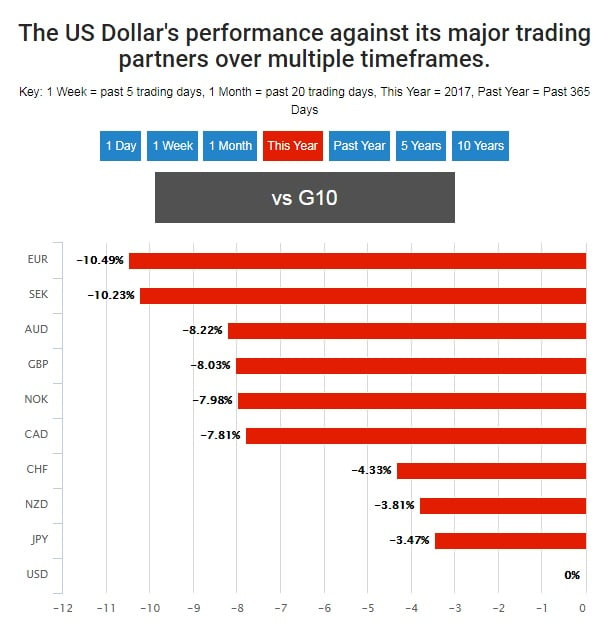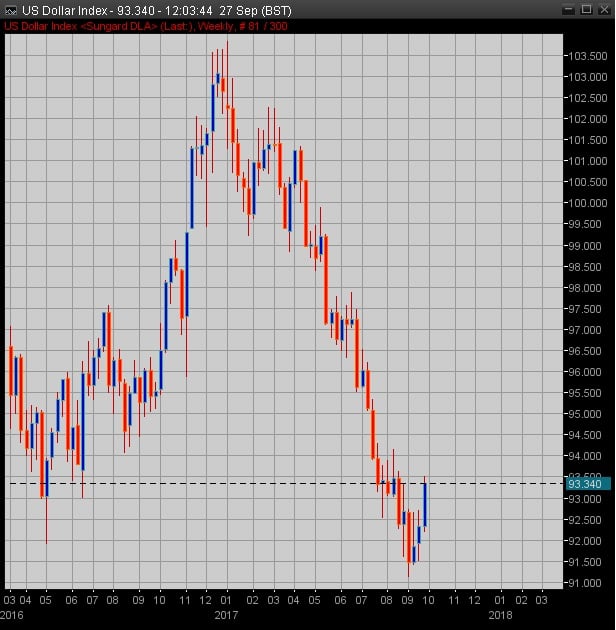Trump's Tax Plans Might Have Muted Longer-Term Impact on US Dollar, but Seen as Positive for Stocks
- Written by: James Skinner

Tax reform is a signature policy of the Trump administration but economists have been sceptical and are now questioning the supposed benefits for the economy.
Tax cuts could boost the US stock market and will amost certainly benefit private shareholders but their impact on the broader economy and therefore, the US Dollar, could be relatively muted.
Such is the a summarised verdict of Wednesday's punditry ahead of an eagerly awaited announcement from the White House.
President Donald Trump is due to speak in Indiana at 21:00 London time where many expect him to unveil details of his signature policy, which is an overhaul of the US tax code combined with big cuts for corporations and households.
Leaked details suggests a lowering of the corporate rate from 35% to 20% will be announced and a reduction to the top income tax rate from 39.6% to 35%.
"The prospect of progress on one of Trump’s market-wooing election promises has helped the Dollar keep hold of most of its daily growth," says Connor Campbell at Spreadex in London.
The White House never looked more beautiful than it did returning last night. Important meetings taking place today. Big tax cuts & reform.
— Donald J. Trump (@realDonaldTrump) September 25, 2017
The Senate Budget Committee will likely vote Monday on a 2018 spending bill that includes an instruction to provide for a $1.5 trillion net tax cut over a ten year period.
“If a similar instruction is finalized by the House and Senate (probably by late October), enactment of tax reform by early 2018 would become more likely, in our view,” says Jan Hatzius, chief economist at Goldman Sachs.
Hatzius notes the plan is unlikely to make its way through the Senate and Congress without being substantially altered.
“The proposed changes the President looks likely to announce on September 27 seem likely to be scaled back as the congressional debate progresses,” says Hatzius. “Given the likely cost of the proposal the White House is likely to release compared with the fiscal constraints the plan will face in Congress.”
In the last week the US Dollar has made valiant attempt at paring its year to date loss, aided by a Federal Reserve that is set to stay the course toward a higher Federal Funds rate, although the greenback is still the worst performing G10 currency in 2017 so far.

Tax Cuts May Not Actually Be That Effective At Stimulating US Growth
Another economist has recently begun to question whether US tax cuts will actually mean much for the economy even if they are enacted.
“The main transmission channel through which taxes are supposed to affect investment spending and the real economy is through (expected) profits,” says Dr Harm Bandholz, an economist at UniCredit. “Companies are more willing to invest if the anticipated return of a particular project is higher or exceeds a certain hurdle rate.”
But Bandholz notes that US corporate profitability is at record levels, so taxes are unlikely an impediment to their ability to do business and cuts might not automatically translate into increased investment.
Furthermore, over recent decades, the portion of company profits that have been returned to shareholders through dividends and share buybacks has increased from 25% in the 1950’s, to nearly 80% in the recent years, according to Bandholz.
“Some of this reflects a change in the financing structure from equity to debt. But more broadly, this behavior signals a growing focus on short-term results rather than on longer-term growth,” says Bandholz. “Moreover, it of course already gives a clear idea of who may benefit the most from corporate tax cuts.”
Bandholz even questions whether tax cuts more broadly, not just in America, are a good policy mechanism for boosting growth, citing a lower "marginal propensity to consume" among those at the higher end of the income spectrum.
This means individuals who earn the top rates of income have a lesser tendency to increase spending in response to positive changes in their income. Taxes are overwhelingly borne by those who occupy the upper echelons of the income spectrum, according to Bandholz, and are often referred to as the owners of capital.
USD May Bounce But The Bond Market Reaction Is The Real Test
While questions around the efficacy of tax cuts are a new slant in the debat, doubts over the Trump administration’s ability to deliver them are not new. Some strategists have reiterated those doubts on Wednesday.
"We're not holding our breath on today's tax plan ticking our ‘trading principles’ at this stage and prompting markets to seriously reprice US reflation prospects. But with the USD in ‘correction mode’, sentiment may drive it higher (DXY to 93.50/60)," says Viraj Patel, a foreign exchange strategist at ING Group. "The true test, however, will be how far the US 10Y yield – as well as metrics like the US 5Y5Y inflation breakeven rate – can move on today’s tax plan unveiling."
Patel says for their to be a serious and durable market move off the back of Wednesday's tax announcement, it needs to be seen as politically credibly and has to make economic sense. In other words, it has to have a good chance of making it through both houses of government in Washington, which are controlled by the Republicans, and it needs deliver an economic benefit.
An economic benefit can in the form of naked tax cuts, so not offset by increases elsewhere, although Patel notes that the process of reforming the overall tax system could have a greater effect on the economy over the longer term than any cuts to the tax rate that come in the shorter term.





